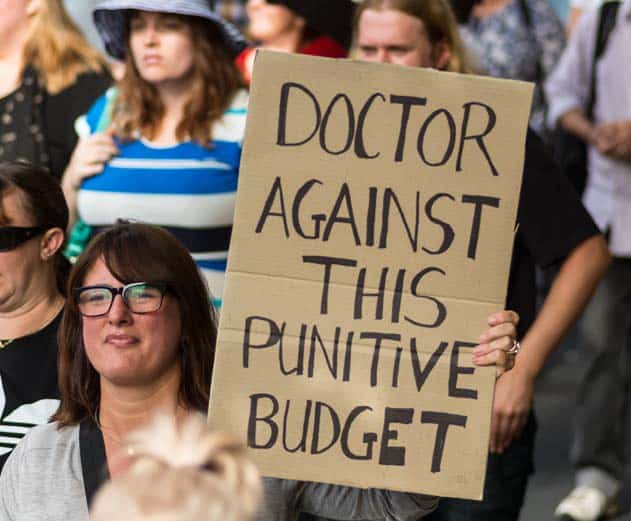The Liberals’ proposed $7 Medicare co-payment is among the most hated element of Abbott’s budget.
It’s clear it will force the poor to choose between basic necessities and visiting the doctor. Even before it has passed into law, and a year before the government plans to implement it, the co-payment is already stopping the poor visiting the doctor.
Some GPs in Western Sydney have sent SMS messages to all their patients to reassure them that the $7 fee is not yet in place.
Since the budget some bulk-billing clinics have seen 30 per cent, and one as much as 50 per cent, reduction in patients according to the AMA.
Brenda Murrison, a Medical Centre director from Bunbury, south of Perth, told the media, “We have received many distressed calls from patients who cannot afford to pay the $7, they don’t want to come in until they check they won’t have to pay it and we have had many patients in tears at the thought.”
The government has tried to defend the $7 fee as a small price to pay, with Treasurer Joe Hockey telling us it was only the price of “a couple of beers”.
Broader agenda
But the charge is the first step in Health Minister Peter Dutton’s broader plan to privatise our health system.
This vision, articulated clearly in the Commission of Audit, is to create a two-tier system. Most people would be forced to pay for private health insurance to cover GP visits, with Medicare becoming a poor-quality safety-net only for those at the very bottom.
Dutton is explicit about this. He has repeatedly said that GP bulk-billing should only be for those on the lowest of incomes, claiming, “Bulk- billing was intended to be for patients who could not afford to a pay a fee” and describing current rates of bulk-billing (80 per cent) as “not sustainable”.
Dutton also wants to remove the current ban on private health insurers from covering GP fees, according to a Sunday Age report citing private meetings held with senior health sector figures.
This would lead to an ever more unequal health system, with some clinics able to massively increase their fees in exchange for higher quality services.
Letting private health insurers into GP clinics would force up the cost of GP services due to the private health companies looking to boost profits. This would open primary healthcare in Australia to the dynamics of the US health system.
The US spends more on healthcare than any other developed nation, nearly double what Australia spends as a proportion of GDP. Yet in 2008 41 per cent of Americans were struggling with medical bills and tens of thousands in medical debt. This market madness is both expensive and lethal, and must be resisted every step of the way.
Already, Medibank Private is trialling a system in Queensland where it funds “administrative costs” for GPs. In return its members receive services not normally available, such as guaranteed appointments within 24 hours and after-hours home visits.
Inevitably the Queensland trial will be ammunition for the Liberals in their struggle to get private insurers into GP services.
Defeating the GP fee
Given the depth of community opposition to the GP fee, the changes could well be blocked in the Senate.
Labor, The Greens and the Palmer United Party all oppose the plan. However until just before the budget Palmer was equivocal saying, “this is something that has to be looked at”.
Terry Barnes, who first floated the co-payment idea in January, has suggested amendments that might help the Liberals get Palmer’s support. He proposes a one-off $70 annual increase to the pension as compensation for the cost of the ten visits before concession card holders get the fee waived.
But the Liberals’ wider plans for the demise of bulk- billing will cause far greater pain, eating into the incomes of workers and the poor over time.
Public health is too important to be left to manoeuvres and amendments in the Senate. We need to keep mobilising to defend Medicare until we can claim a definite victory against the co-payment and the user-pays model. It is only the movement on the streets and in workplaces that can ensure that bulk-billing is here to stay, and fight for it to be extended, not whittled down.
A defeat for the GP fee in the Senate would be a good early victory against Abbott’s budget. But it would not end the Liberals’ plans to dismantle what remains of Australia’s public health system.
As President of the Doctors’ Reform Society Con Costa has argued, even without implementing the co-payment, the debate itself has already weakened bulk-billing by creating the sense that eventually all GP visits will be user-pays.
The more prominent the issue on the streets, the more pressure on the likes of Palmer to vote against any co-payment.
The defeat of the co-payment will put us in a stronger position to keep private health insurers out of primary healthcare, and also to expose the existing role of private insurance in our hospitals, specialists and pharmaceuticals.
It is part of the fight for a genuinely universal health system where health needs come before corporate greed.
By Jean Parker





